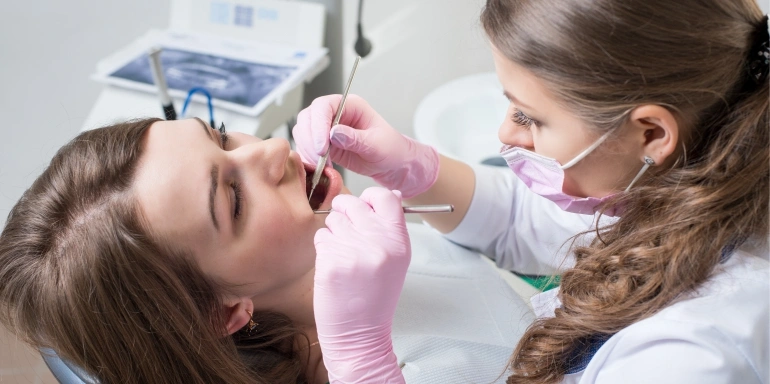How Long Do Gums Take To Heal After Scaling?
Gums generally take 5 to 7 days to fully heal after scaling. However, this time can vary depending on the severity of gum disease on the client and the scaling procedure’s extent.
After scaling, your gums may feel sensitive and irritated for a few days. Follow your dentist’s aftercare instructions during the healing process. This usually includes gentle brushing and flossing, using a saltwater rinse, and avoiding hard or crunchy foods. Inform your dentist immediately if you feel strange pain or discomfort or spot infection-related symptoms like intense redness or swelling.
What is gum scaling?
Gum scaling is a professional dental cleaning that removes plaque and tartar accumulation from the gum line and the surfaces of the teeth. By cleaning bacteria and other dangerous substances from the mouth, gum disease can be prevented or treated.
Scaling is often performed as part of routine dental cleaning, but it may also be recommended for patients with more severe gum disease, such as periodontitis. In some cases, the procedure may be combined with root planing, which involves smoothing the roots of the teeth to promote healing and prevent further damage to the gums.
Can scaling damage gums?
Extensive cleansing of gums during scaling is usually considered a safe and reliable technique. However, gum damage may be serious if the treatment is not carried out appropriately by a trained dentist or if the patient has underlying oral pathologies.
If the scaler is used too aggressively or applied with too much pressure, it can cause damage to the gum tissue and potentially lead to bleeding, swelling, or other complications. However, these complications are minimal when performed by a skilled professional.
Do gums grow back after scaling?
After scaling, the gums may appear to grow back in some cases, but they do not truly regenerate. However, the removal of plaque and tartar can help to improve gum health and prevent further damage, which can give the appearance of gum regrowth.
Gum disease draws back or recedes gums from the teeth, leaving spaces or pockets where germs can grow and cause more harm. Scaling helps remove this buildup and reduce inflammation, allowing the gums to heal and reattach to the teeth, which looks like gum regrowth.
You should remember that the severity of the gum disease and the person’s dental health will determine how much gum regrowth occurs after scaling. To address more severe forms of gum disease and encourage gum regeneration, seeking further treatment, such as gum surgery, may occasionally be essential.
Do gums tighten after scaling?
Scaling can reduce gum inflammation and allow them to heal, resulting in tighter and healthier gum tissue. As it is common for patients to experience some initial gum tenderness and sensitivity, when gums heal and inflammation subsides, they may begin to tighten around the teeth, making them appear tighter.
While gums may not necessarily “tighten” after scaling, cleaning of plaque and tartar may improve gum health and promote healing, resulting in healthier and more stable gum tissue.
Get Healthy and Disease Free Gums With Scaling
If you are experiencing gum disease symptoms like bleeding gums, bad breath, or tooth sensitivity, it’s time to seek professional Scaling and Root Planing. Our gum scaling service at Miracle Dental Center is designed to remove plaque, tartar, and bacteria from your gums to promote healing and prevent further damage.
Book your appointment with our Dentist In Southampton to take the first step toward healthy gums.

